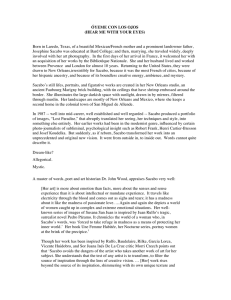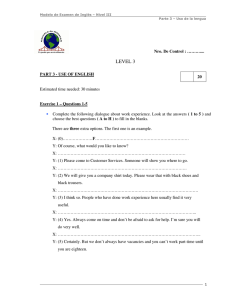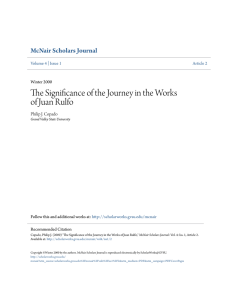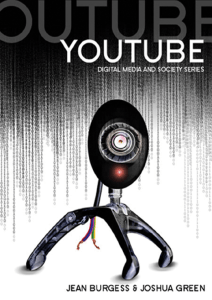I COURSE DESCRIPTION The reading, discussion and analysis of
Anuncio
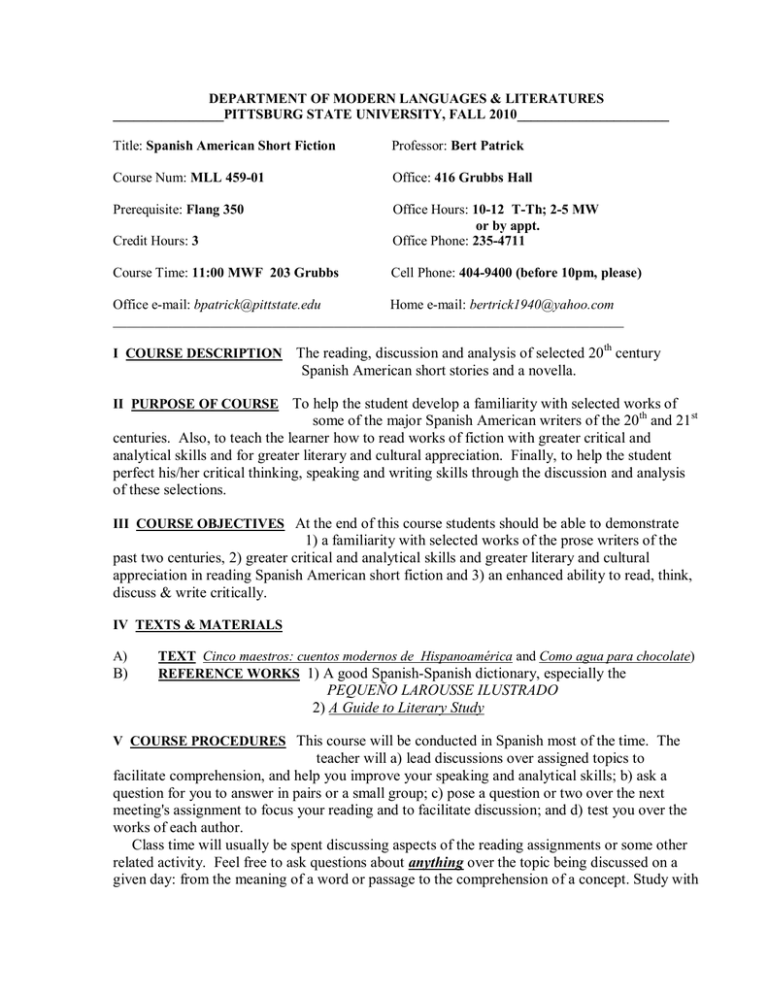
DEPARTMENT OF MODERN LANGUAGES & LITERATURES ________________PITTSBURG STATE UNIVERSITY, FALL 2010______________________ Title: Spanish American Short Fiction Professor: Bert Patrick Course Num: MLL 459-01 Office: 416 Grubbs Hall Prerequisite: Flang 350 Credit Hours: 3 Office Hours: 10-12 T-Th; 2-5 MW or by appt. Office Phone: 235-4711 Course Time: 11:00 MWF 203 Grubbs Cell Phone: 404-9400 (before 10pm, please) Office e-mail: [email protected] Home e-mail: [email protected] __________________________________________________________________________ I COURSE DESCRIPTION The reading, discussion and analysis of selected 20th century Spanish American short stories and a novella. II PURPOSE OF COURSE To help the student develop a familiarity with selected works of some of the major Spanish American writers of the 20th and 21st centuries. Also, to teach the learner how to read works of fiction with greater critical and analytical skills and for greater literary and cultural appreciation. Finally, to help the student perfect his/her critical thinking, speaking and writing skills through the discussion and analysis of these selections. III COURSE OBJECTIVES At the end of this course students should be able to demonstrate 1) a familiarity with selected works of the prose writers of the past two centuries, 2) greater critical and analytical skills and greater literary and cultural appreciation in reading Spanish American short fiction and 3) an enhanced ability to read, think, discuss & write critically. IV TEXTS & MATERIALS A) B) TEXT Cinco maestros: cuentos modernos de Hispanoamérica and Como agua para chocolate) REFERENCE WORKS 1) A good Spanish-Spanish dictionary, especially the PEQUEÑO LAROUSSE ILUSTRADO 2) A Guide to Literary Study V COURSE PROCEDURES This course will be conducted in Spanish most of the time. The teacher will a) lead discussions over assigned topics to facilitate comprehension, and help you improve your speaking and analytical skills; b) ask a question for you to answer in pairs or a small group; c) pose a question or two over the next meeting's assignment to focus your reading and to facilitate discussion; and d) test you over the works of each author. Class time will usually be spent discussing aspects of the reading assignments or some other related activity. Feel free to ask questions about anything over the topic being discussed on a given day: from the meaning of a word or passage to the comprehension of a concept. Study with other persons in the class is beneficial and is definitely encouraged. Student Responsibilities Work on task...the entire time we are in class. If you finish before others, chat in Spanish about the class, review, look ahead…but stay on task. Work cooperatively, in pairs, in small groups or as an entire class. Be the best partner/member possible! Try to work with a different partner every day; this permits you to meet every one and to play the three roles of interacting with others. Look only at your own information, if appropriate: don’t peek at your partner’s. Enunciate and speak clearly. Your partner(s) deserve to know what you are saying. **If you are a native speaker, s-l-o-w d-o-w-n when speaking with a non-native. Help them improve their listening comprehension skills, just as others have helped you improve yours in English.** Correct each other’s grammar/pronunciation/spelling… when needed. Making mistakes….and learning from them…is why we are here. If you had already mastered this information or had these skills, you wouldn’t need to be in this class. However, correct each other in a supportive, non-critical, non-judgmental way. Always be positive!!! Speak only in Spanish; use gestures if needed to convey meaning. It is SO easy to just say it in English, but staying in Spanish, using circumlocution and struggling through the challenge is how we grow. This is true in every aspect of life. No pain, no gain is a truism. VI. OVERALL EVALUATION A EXAMS There will be 6 tests in this course. The first five will be over the works of each author; the sixth will be during finals week over a story you have probably never read before, in order for you to demonstrate how well you have developed your skills to analyze, organize your ideas and then express them effectively in writing. Do not retell the action or plot of the story; rather, analyze as many aspect(s) of it as your ability will allow: the theme (the significance of the action), the characterization (the essence of a/some characters or how [s]he/they are developed), language, structure, setting, etc. You will be graded on both the content of your analysis and the quality of your writing skills. The exam over each author’s works is 15% of your grade, a total of 90%. B CLASS DISCUSSION You will also be evaluated on the quality and frequency of your contributions to the discussions of the works we read. This portion is 5% of your final grade. C CONVERSATION PARTNER You are to schedule a weekly conversation session with a partner ASAP. Talk about the issues being explored in this course. For example, retell the story or chapter in as great a detail as possible to test your recall and ability to “narrate.” Analyze aspects of the story. For example, talk about the narrative point of view and how it affects the information presented; the characters, their function and how they are presented/developed; the structure of the work; the conflict and how it is resolved; the setting and its effect on the action; the ideas; your reaction to the story, that is, why you think it is good or not. In short, you have plenty to talk about each session; take advantage of this opportunity to learn to express your ideas more effectively and to discover what you think about the stories in the process of articulating your ideas. 5% of course grade. D CLASS ATTENDANCE I expect you to be in class every day, prepared to participate fully. Should you miss class, it is your responsibility to get the next day’s assignment (call me or a classmate) and return to class prepared to participate fully in the activities. I take roll each day. Each class meeting you miss, for whatever reason, will result in this portion of your grade being reduced by five percent [5%]. Arriving in class after we have begun is considered a tardy and is the equivalent of a half an absence. If on a given day, however, you have an exam or a presentation to make in another class and you are not prepared, go ahead and come to class; before class gets under way, ask me not to call on you on that day and I will respect your request. You learn more by just being in class, observing and listening, than you do by missing. This is 5% of your grade. D. EVALUATION CRITERIA 1 Six exams over works of each author (6 X 14.66%) = 85% 2 Participation in class discussions 05% 3 Conversation sessions 05% 4 Attendance 05% Total 100% E. GRADING SYSTEM A 100-90; B 89-80; C 79-70; D 69-60; F 59-00 VII IKE CREDIT This course counts towards the academic component of the IKE Certificate of International Knowledge and Experience. The IKE Certificate may be earned by students in any major. The academic component consists of five courses - two semesters of a foreign language, and three courses with international content in three different disciplines. To receive the certificate, students must also complete a second component, either by studying abroad, or by participating in co-curricular activities on campus. Completion of the IKE certificate as an undergraduate is noted on a student's PSU undergraduate transcript, although graduate students may also earn the certificate. To be added to the IKE Angel group and start tracking your progress towards the certificate, please e-mail your GUS number in a request to Megan Corrigan [email protected]. VIII KANSAS STATE DEPT OF EDUCATION (KSDE) TEACHING STANDARDS This course meets the following KSDE teaching standards: Standard #1 Knowledge 1, 2, 3, 4. Performances 1, 2. Standard #2 Performance 8. STUDY ABROAD The department strongly recommends that all Modern Languages and Literatures majors and minors participate in an accredited study abroad program. PSU offers study abroad scholarships as well as assistance with other financial aid. To learn about accredited programs, contact Megan Corrigan, Study Abroad Coordinator, at 235-4221 or visit 118C Whitesitt Hall. For information on transfer credits, consult with Judy Berry-Bravo, Chair of Modern Languages and Literatures, at 235-4708 or visit 429 Grubbs Hall. HORARIO DE CLASES AUG 23 Introducción 25 “Fiction” , 11-33 27 Juan Rulfo v-vii, 117-119; http://www.youtube.com/watch?v=yQHbz4F14ho (homenaje a Rulfo 3’12”); http://en.wikipedia.org/wiki/Juan_Rulfo; http://es.wikipedia.org/wiki/Juan_Rulfo (versión en español); http://video.google.com/videoplay?docid=-7495550766501139260# (entrevista a Rulfo en televisión española); cualquier otra fuente biográfica acerca de Juan Rulfo. 30 Juan Rulfo: No oyes ladrar los perros 158; Rulfo lee el cuento: http://www.youtube.com/watch?v=cewv7qyUpsA SEP 1 Rulfo: Es que somos muy pobres 121 3 Rulfo: Luvina 147 (http://www.youtube.com/watch?v=mZEu5r75ztQ 5’42”) 6 Día del Trabajo: ¡ no hay clase! 8 Rulfo: El hombre 127 (http://www.youtube.com/watch?v=b7Le0taJMXg&feature=related 7’52”) 10 Rulfo: ¡Diles que no me maten! 138; http://www.youtube.com/watch?v=s28GY7ImKA4&feature=related (Rulfo lo lee – Parte 1); http://www.youtube.com/watch?v=S8J906FHMNA&feature=related; 13 1o Examen: Los cuentos de Juan Rulfo 15 Gabriel García Márquez v-vii, 223-225; http://en.wikipedia.org/wiki/Gabriel_Garc%C3%ADa_M%C3%A1rquez ; http://es.wikipedia.org/wiki/Gabriel_Garc%C3%ADa_M%C3%A1rquez (versión en español); http://www.youtube.com/watch?v=GMpsqbge99c ; http://www.youtube.com/watch?v=5iz3bhmqyY&NR=1 ; http://www.youtube.com/watch?v=j4MZ_X1DnwA&feature=related (estos tres videos componen una entrevista de GGM más escenas de sus obras filmadas y del mundo del que él escribió) ; http://www.documen.tv/asset/view_trailer_html.php?trailer_filename=zarafa/STARTPreviewGA BRIELGARCIAMARQUEZProgD512Kbps.mov&trailer_pub=PUB/STARTPubSansuiProgD1M bps001.mov (fragmento de una entrevista de GGM y escenas de Macondo, Colombia) ; http://www.youtube.com/watch?v=7AOh8L2AP0s (carta de despedida…en inglés) ; http://www.youtube.com/watch?v=TJcubSlYWnQ&feature=related (carta de despedida..en español) 17 GGM: La viuda de Montiel 256 (http://www.youtube.com/watch?v=dumYp3k9YWQ 10’33”) 20 GGM: La siesta del martes 264 22 GGM: La prodigiosa tarde de Baltasar 247 24 GGM: Los funerales de la Mamá Grande 227 27 GGM: 2o Examen: Los cuentos de Gabriel García Márquez 29 Julio Cortázar: v-vii, 59-61; http://en.wikipedia.org/wiki/Julio_Cort%C3%A1zar ; http://es.wikipedia.org/wiki/Julio_Cort%C3%A1zar (versión en español) ; http://video.google.com/videoplay?docid=-3562250863327291954&sourceid=docidfeed&hl=es/# (entrevista a fondo de Cortázar) ; OCT 1 Cortázar: Casa tomada (story & vocab available at Lessons on Angel) (http://www.youtube.com/watch?v=tWP5oaNtJzU&feature=related 5’36” Cortázar lee el cuento; http://www.youtube.com/watch?v=OaTh4YRwNHo&feature=related 2’01”; http://www.youtube.com/watch?v=t0XGjCC8mcg&feature=related 9’15”; http://www.youtube.com/watch?v=7WCkhLhR2xk&feature=related 7’50”; http://www.youtube.com/watch?v=h4MV_q2N0jo&feature=related 1ª parte 5’56”; http://www.youtube.com/watch?v=PsggfN4hBRg 2ª parte 6’04”; http://www.youtube.com/watch?v=9q8Zx2toato&feature=related 3ª parte 6’40”) 4 Cortázar: Fin del juego (available at Lessons on Angel) 6 Cortázar: La puerta condenada (available at Lessons on Angel) (http://www.youtube.com/watch?v=2cEPodT0b60&feature=related 1a parte 8’29”; http://www.youtube.com/watch?v=AWd3HSA4iWQ&feature=related 2a parte 8’03”) 8 No hay clase 11 Cortázar: La salud de los enfermos 98 13 3o Examen: Los cuentos de Julio Cortázar 15 Jorge Luis Borges: v-vii, 3-6; http://en.wikipedia.org/wiki/Jorge_Luis_Borges; http://es.wikipedia.org/wiki/Jorge_Luis_Borges (en español); http://www.ubu.com/film/borges.html (video) 18 Borges: La intrusa 50 (http://www.youtube.com/watch?v=KmFIpW1anY8&feature=related 6’12”) 20 Borges: El Sur 41 22 Asueto otoñal 25 Borges: La muerte y la brújula 27 27 Borges: Deutsches Requiem 9 29 No hay clase NOV 1 Borges: El milagro secreto 18 3 4o Examen: Los cuentos de Jorge Luis Borges 5 No hay clase 8 Laura Esquivel: http://en.wikipedia.org/wiki/Laura_Esquivel; http://es.wikipedia.org/wiki/Laura_Esquivel_(escritora) ; 10 Esquivel: Como agua para chocolate Cap. 1 12 Esquivel: Cap. 2 15 Esquivel: Cap. 3 y 4 17 Esquivel: Cap. 5 19 Esquivel: Cap. 6 22 Esquivel: Caps. 7 y 8 24-26 **Vacaciones para el Día de Gracias** 29 Esquivel: Cap. 9 y 10 DIC 1 Esquivel: Cap. 11 3 Esquivel: Cap. 12 6 Película: Como agua para chocolate 8 Película: Como agua para chocolate 10 5o Examen: Como agua para chocolate DIC 13-17 Semana de exámenes finales 6o Examen: análisis de un cuento
